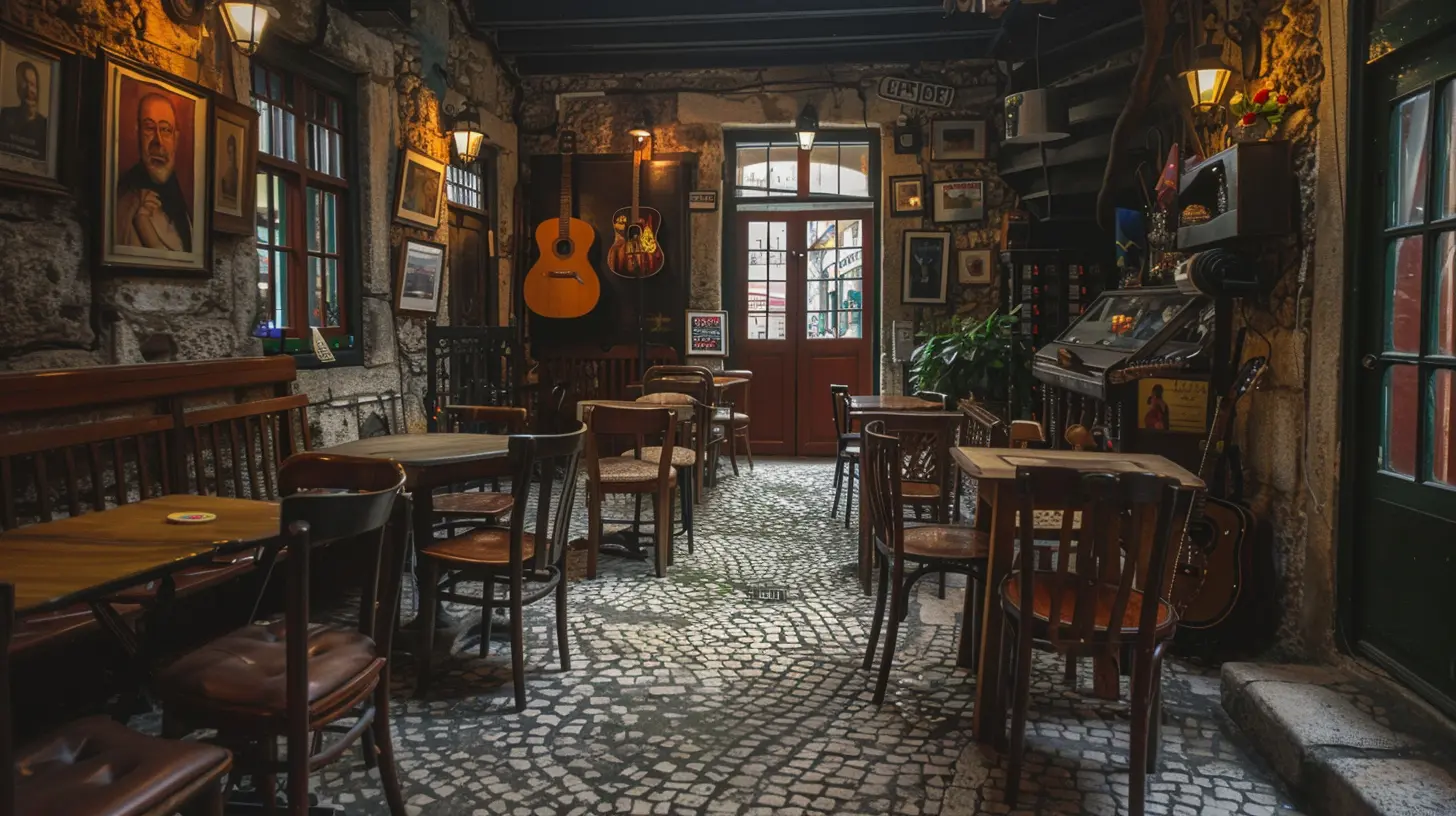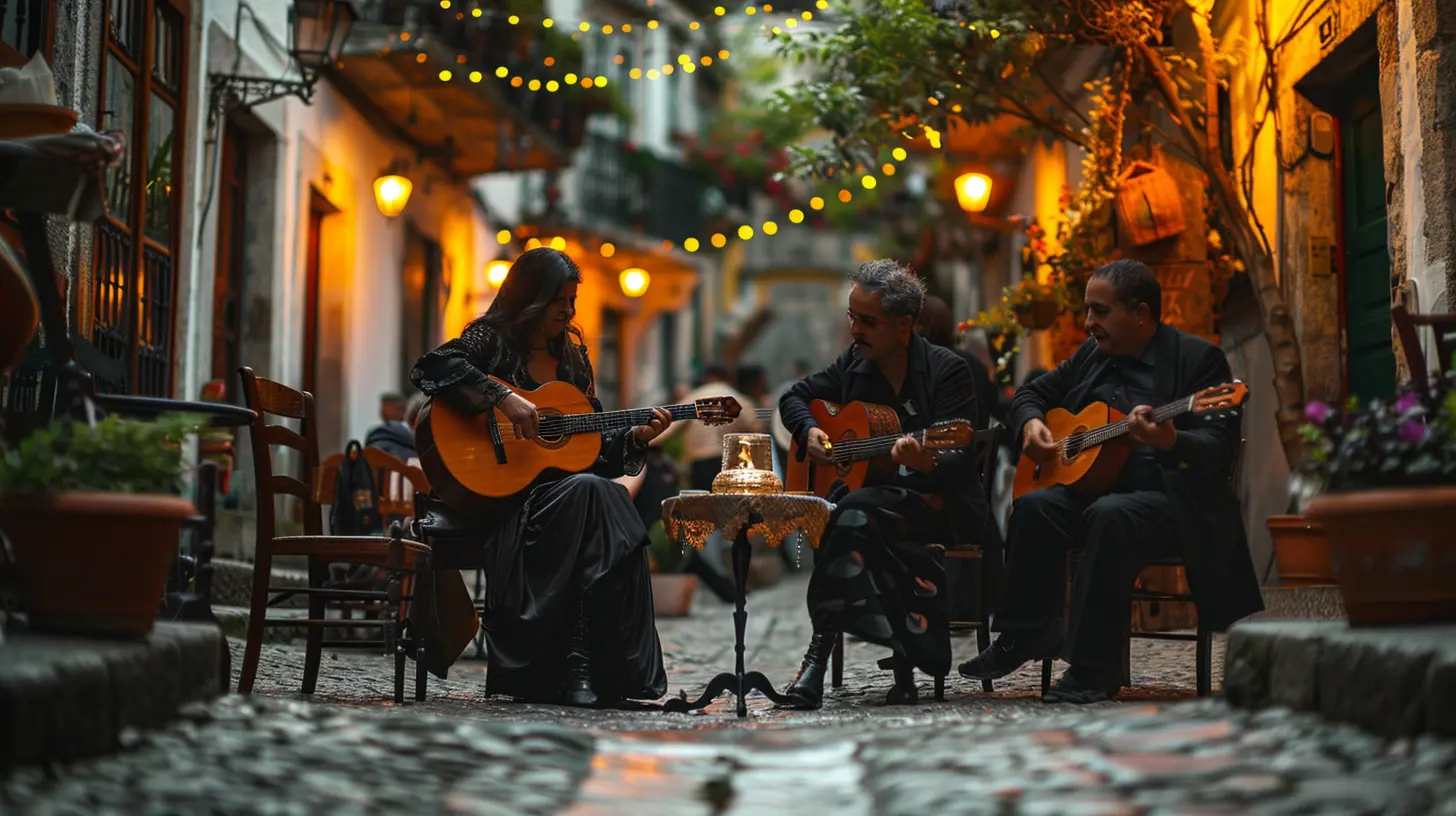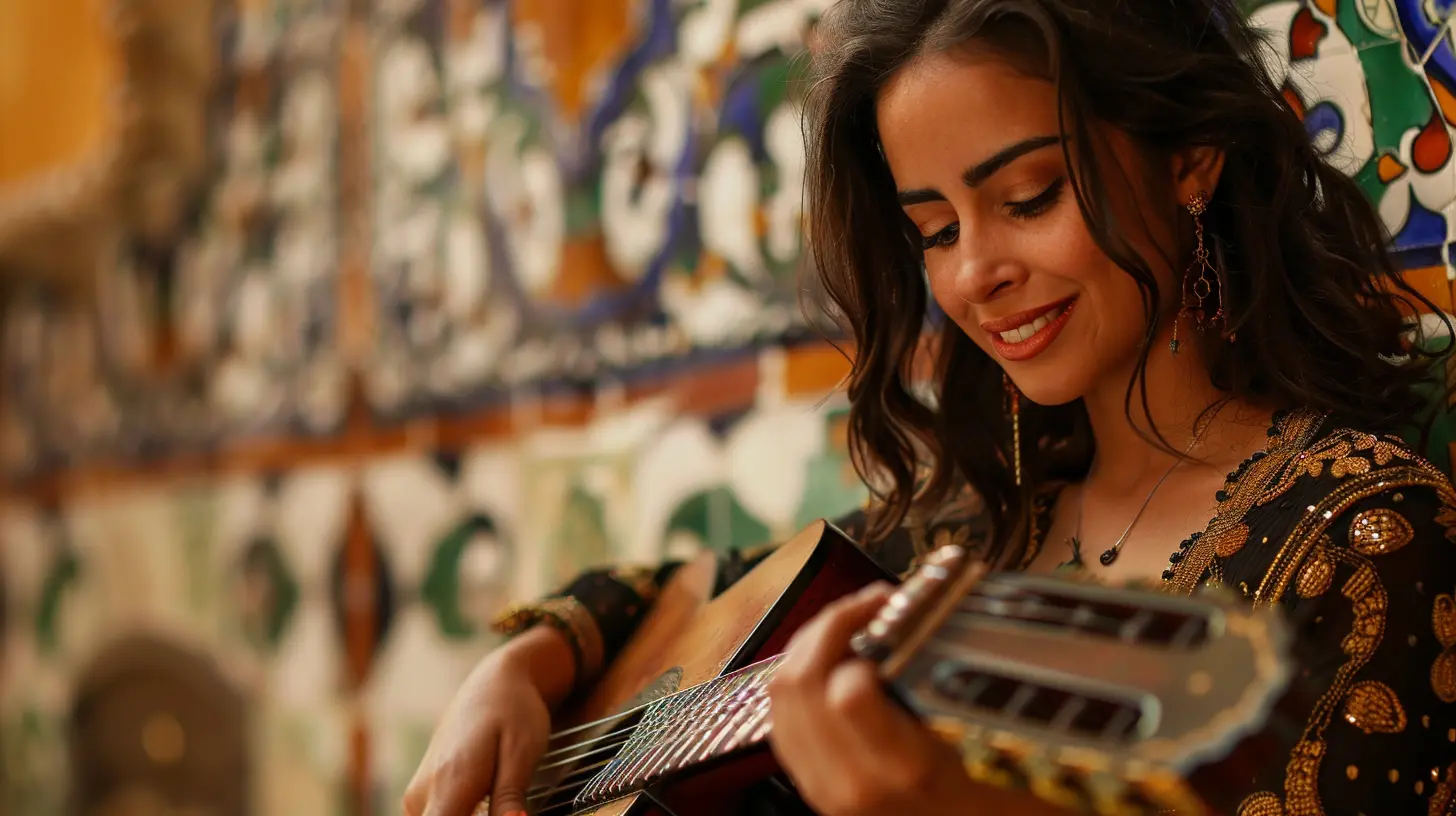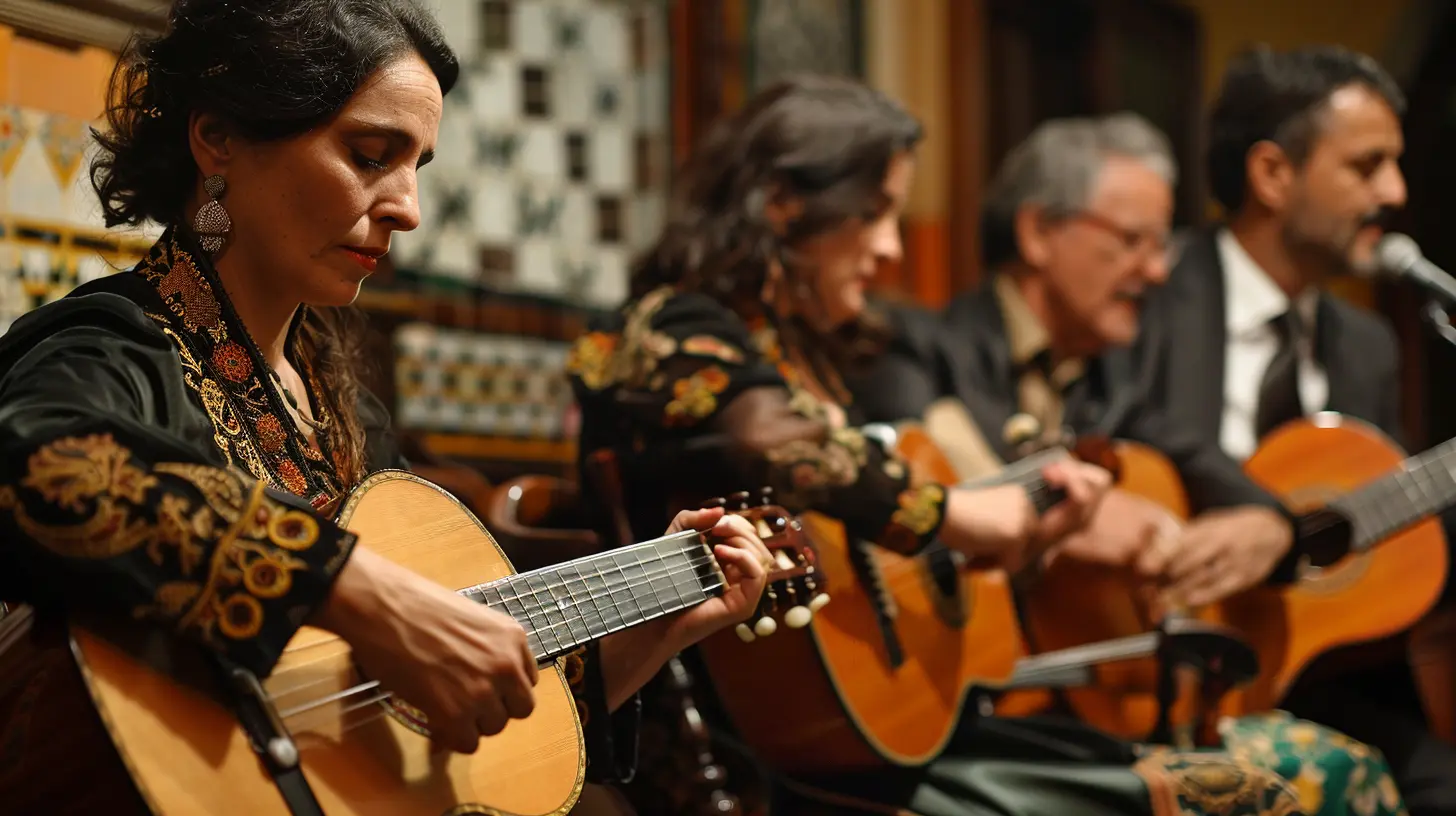The Historical Charms of Portuguese Fado and its Cultural Roots
11 April 2025
Picture this: dimly lit taverns, the mournful strumming of a Portuguese guitar, and a voice so full of longing that it tugs at your soul. That’s Fado—a musical genre that doesn’t just tell stories but makes you feel them.
But where did Fado come from? And why does it resonate so deeply with the Portuguese people? Buckle up (or, better yet, grab a glass of vinho verde), because we're about to dive into the heart and history of this melancholic yet enchanting genre.

What Exactly Is Fado?
Fado isn't just music—it's emotion put into sound. The word fado literally translates to "fate" or "destiny," and that pretty much sums it up. It's music born from deep longing, nostalgia, and heartbreak, often telling tales of sailors lost at sea, unfulfilled love, and the bittersweet experiences of life.If you're hearing Fado for the first time, it will feel like an emotional rollercoaster—one moment, you might be smiling at a playful song, and the next, you could find yourself wiping away a tear. It’s that powerful.

The Mysterious Origins of Fado
While Fado is now one of Portugal’s most treasured cultural expressions, its origins are a bit murky. Some say it emerged from Moorish songs; others believe it has Brazilian influences brought back by sailors. One thing’s for sure—this genre flourished in Lisbon in the early 19th century, particularly in the city's most humble neighborhoods.The Influence of Lisbon’s Streets
In the backstreets of Lisbon, particularly in areas like Alfama, Mouraria, and Bairro Alto, Fado found its home. These were working-class neighborhoods filled with sailors, prostitutes, and bohemians. Life wasn’t easy, and music became an outlet for both suffering and joy.Many early Fado songs were improvised, woven into everyday conversations. Picture walking down the cobbled streets of Alfama at night—windows open, voices carrying into the air, and somewhere, a lone guitarist pouring his soul into a melody. It was raw, real, and completely captivating.
Links to the Sea and Saudade
Portugal has always been a seafaring nation, and Fado reflects that. Imagine the anguish of wives and mothers saying goodbye to their loved ones, knowing they might never return. That deep sense of longing—that’s saudade, an emotion so uniquely Portuguese that there’s no direct English translation. It's a blend of nostalgia, love, and sorrow all wrapped into one.Fado became the voice of saudade, capturing the pain of separation and the hope (or hopelessness) of reuniting someday. And that's why Fado still strikes a chord with those who hear it—it taps into universal emotions we've all felt at some point.

Fado’s Evolution: From Taverns to Global Stages
Although Fado started as the music of Lisbon’s lower classes, it didn’t stay there. Over time, it evolved into a national treasure, moving from dim-lit taverns to grand stages, and eventually, the world.The Queen of Fado: Amália Rodrigues
You can’t talk about Fado without mentioning Amália Rodrigues. If Fado had a queen, she would be it. Born in 1920, Amália brought Fado to a broader audience, both within Portugal and beyond. Her haunting voice and emotional performances turned Fado into a respected art form.She helped refine traditional Fado while also introducing poetic lyrics and modern arrangements. Today, even after her passing, her legacy remains. Walk into any Fado house in Lisbon, and you’ll likely hear her voice playing in the background.
Fado in UNESCO’s Cultural Heritage List
In 2011, UNESCO recognized Fado as part of the Intangible Cultural Heritage of Humanity. This was a big deal. It meant that Fado wasn’t just a Portuguese treasure—it belonged to the world.Fado houses, or casas de fado, ensure that the tradition lives on. Here, singers and musicians perform in intimate settings, keeping the spirit of Fado alive. If you ever visit Lisbon, skipping a Fado night would be like going to Paris and ignoring the Eiffel Tower—it’s just something you have to experience.

The Two Faces of Fado: Lisbon vs. Coimbra
While Lisbon is the birthplace of Fado, there’s another version that thrives in Coimbra, home to Portugal’s oldest university. And let me tell you—it’s different.Lisbon Fado: The Voice of the Streets
Lisbon’s Fado is dramatic, raw, and often spontaneous. It’s dominated by female singers (fadistas) dressed in black, their voices dripping with emotion. Accompanied by the Portuguese guitar and classical guitar, the music feels personal, as if the singer is revealing their deepest secrets.This is the kind of Fado you’ll hear in Alfama’s cozy taverns, where the audience sits in respectful silence, absorbing every note.
Coimbra Fado: The Serenade of Scholars
Coimbra's Fado, on the other hand, is more academic and poetic. Traditionally performed by male university students, it has a gentler and more reflective tone. Instead of lamenting lost love or fate, these songs often focus on culture, student life, and the passage of time.The singers wear black capes (yes, like something straight out of Harry Potter), and after performances, it’s customary for the audience to clap softly, rather than loudly applaud, as a sign of respect.
Keeping Fado Alive in the Modern Age
You might be wondering—how does Fado fit into the 21st century? In a world obsessed with pop, EDM, and autotune, does Fado still have a place? Absolutely.While traditional Fado thrives in Lisbon’s historic neighborhoods, modern artists are blending it with different genres, making it accessible to younger audiences. Artists like Mariza and Ana Moura are creating fresh takes on Fado, mixing it with jazz, folk, and even pop, without losing its soul.
Fado is not just nostalgia—it’s a living, evolving art form that continues to move people, regardless of their background.
How to Experience Fado Like a Local
If you're planning a trip to Portugal (which you totally should), experiencing Fado should be at the top of your list. Here’s how to do it right:1. Visit a Casa de Fado – These intimate venues, typically found in Alfama, Bairro Alto, and Mouraria, offer the best authentic performances. Popular spots include Clube de Fado, A Tasca do Chico, and Mesa de Frades.
2. Respect the Silence – Fado isn’t background music. When the performance starts, hush up and let the singer work their magic.
3. Have Dinner with Fado – Some Fado houses offer dinner and a show—think delicious Portuguese food paired with soul-touching music. Wine and Fado? Yes, please!
4. Go Off the Beaten Path – Seek out smaller, less touristy venues for a truly emotional experience. Sometimes, the best performances happen in little, tucked-away taverns.
5. Listen Before You Go – Familiarize yourself with Amália Rodrigues, Mariza, or Carlos do Carmo before your trip. Trust me, it’ll make the experience even more meaningful.
Final Thoughts
Fado isn’t just music—it’s an emotion, a story, and a way of life. It captures the spirit of Portugal in a way no words ever could. Whether you hear it in a dimly lit tavern or on a grand concert stage, one thing is certain—you’ll feel it deep in your bones.So, next time you're wandering the streets of Lisbon at night, let yourself be lured by the sorrowful sound of a Portuguese guitar drifting through the air. You might just find yourself falling in love with the melancholic beauty of Fado.
all images in this post were generated using AI tools
Category:
Cultural ToursAuthor:

Shane Monroe
Discussion
rate this article
5 comments
Elena Cross
Fado is a beautiful expression of Portuguese culture, blending haunting melodies with profound emotions. This article beautifully captures its historical significance and cultural roots, inviting readers to explore the rich, soulful world of Fado music.
April 17, 2025 at 4:19 PM

Shane Monroe
Thank you for your insightful comment! I'm glad you enjoyed the article and appreciate the beauty of Fado music.
Wilder McKinley
What a beautifully written piece! Fado's rich history and emotional depth truly reflect Portugal's vibrant culture. Thank you for sharing!
April 14, 2025 at 3:14 PM

Shane Monroe
Thank you for your lovely comment! I'm glad you enjoyed the piece and appreciate Fado's cultural significance.
Marcus Evans
Fado beautifully captures Portugal's rich cultural heritage!
April 13, 2025 at 3:49 AM

Shane Monroe
Thank you! I'm glad you appreciate Fado's deep connection to Portugal's cultural heritage.
Atlas McNeil
Beautifully captured! Fado's depth truly reflects Portugal's rich heritage.
April 12, 2025 at 3:34 AM

Shane Monroe
Thank you! I'm glad you appreciated the depth of Fado and its connection to Portugal's heritage.
Tempest Stevens
Fado is like a warm embrace on a chilly evening, full of soul and stories. Exploring its rich history feels like stepping into a vibrant tapestry woven with passion and nostalgia. Every note resonates with the heart of Portugal—truly a cultural gem!
April 11, 2025 at 2:47 AM

Shane Monroe
Thank you for your beautifully expressed thoughts! Fado truly encapsulates the soul of Portugal, and I'm glad you resonated with its rich history and emotional depth.




